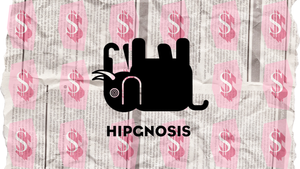Hipgnosis founder Merck Mercuriadis has commented on recent trends and debates in the music rights sector in the latest annual report prepared for investors in the Hipgnosis Songs Fund. He also discusses frustrations around the publicly listed fund’s current share price.
Mercuriadis has played a key role, of course, in the surge of interest we’ve seen in recent years within investment circles in owning music rights. And the publicly listed Hipgnosis Songs Fund – as well as Hipgnosis Songs Capital, a separate private fund backed by private equity giant Blackstone – have been behind numerous headline-grabbing rights acquisition deals.
Given that the majority of the acquisitions by Hipgnosis have been song rights rather than recording rights, Mercuriadis has also been very vocal about the perceived undervaluation of songs, for example in the streaming domain, where the majority of revenue goes to the recordings.
Speaking on an investor call yesterday, Mercuriadis said: “As stated at the time of our IPO, we wanted to use our platform to advocate for songwriters to take them from the bottom of the economic equation to the top … I’m delighted that through our efforts the true value of songs and songwriters is increasingly being recognised around the world”.
In the annual report, he specifically welcomes the recent increases in the streaming royalty rates for songs in the US, where a compulsory licence applies and the rates are ultimately set by the Copyright Royalty Board.
He also references the recent metadata code that has been agreed upon within UK music industry which seeks to address some of the data issues that negatively impact on the payment of song royalties. He states: “We welcome this first step. However, we believe that far greater reform is needed and we continue to engage with the relevant organisations to achieve this change”.
In addition to the ongoing conversation about how streaming money is split between the recording rights and the song rights, there is the increasingly high profile debate about how streaming revenues are allocated to individual tracks by the streaming services.
“Due in part to our advocacy on behalf of songwriters and artists”, Mercuriadis adds, “the major record labels are increasingly recognising the value of the content that they allow streaming platforms to use. Rightsholders and [streaming services] are questioning the current streaming business model, which pays the same per stream for high quality songs as is paid for unknown songs”.
“Additionally”, he goes on, “there is an increased focus on solving the problem of digital trappers, stream farms and bots, which are believed to be distorting the distribution of streaming revenues. Given the quality of the company’s catalogue, we are confident that the company’s shareholders will eventually further benefit from improvements in the economic equation for songwriters”.
Addressing the topic of artificial intelligence – and whether it presents an opportunity or a threat for investors in the Hipgnosis Songs Fund – Mercuriadis says that AI technologies can “offer new opportunities which we are already looking to use in support of our iconic songs … AI enables us and other creators to quickly and cost effectively deliver new versions of these songs, create interpolations or otherwise introduce our music to new audiences”.
As for the debates around AI and copyright, he continues: “Global copyright laws provide a significant degree of protection for our intellectual property … we will support measures which prevent AI from learning from in-copyright music and recordings to the detriment of artists and songwriters”.
Mercuriadis also discusses in the annual report the Fund’s current share price, which is currently 73.16p, from a high of 129.20p in November 2021.
There has been speculation in the financial press this week that the Fund might look to sell some of its catalogue later this year as part of a plan to boost the share price – though those rights could be bought by that separate Blackstone-backed private fund Hipgnosis Songs Capital.
On all that, Mercuriadis writes: “The current share price does not reflect the success of our investment strategy and I know all shareholders share my frustration and disappointment that this is the case”.
“When we launched the company, we created a new asset class with songs. It is therefore perhaps not a surprise that, in a world of incredible turmoil following a global pandemic, the largest war in Europe in nearly 80 years and increasing inflation and interest rates, that some investors have turned to ‘risk free’ safe havens over exposure to new asset classes”.
“However”, he goes on, “despite these unique macroeconomic conditions, the strong growth in paid consumption for music continues. The music industry is rapidly growing and thriving while others contract and, as a result, song catalogues continue to be a highly attractive asset. We are aligned with shareholders in believing that the fundamental value and opportunity of the company fails to be reflected in the current share price”.
“As a result, we have been working with the board, following consultation with many of the company’s largest shareholders, on a number of options to enhance shareholder value”. An update on that will be provided before the Fund’s Annual General Meeting in September, he confirms.
Elsewhere in Hipgnosis news, Hipgnosis Song Management – a separate company which advises the funds and manages their rights – announced earlier this week that its Chief Music Officer, former major label exec Ted Cockle, is standing down.
Meanwhile, there were some new appointments too, including Danny Bennett as Executive Vice President, Sara Lord as EVP Content Creation and Patrick Joest as Head Of Synchronisation.

